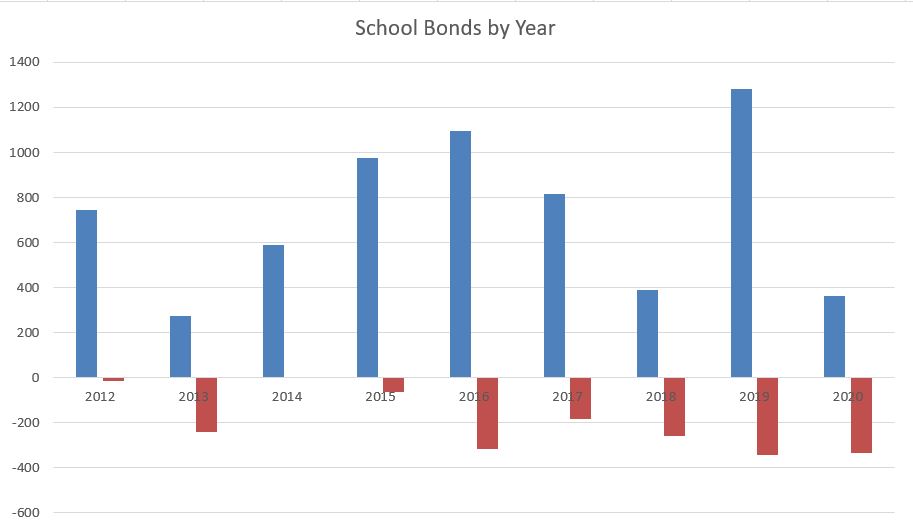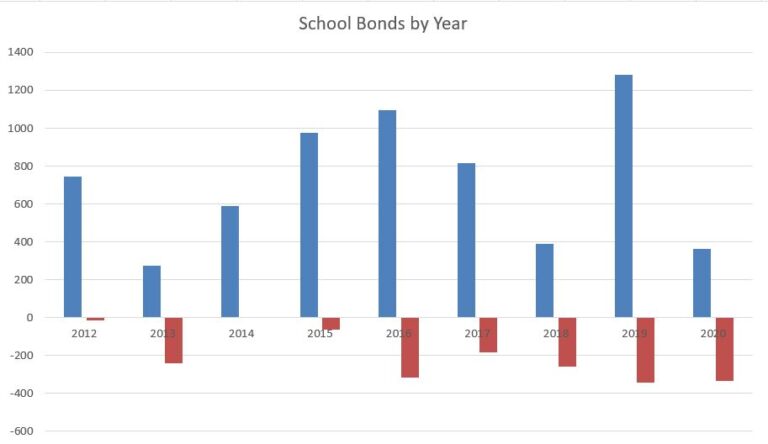By Tasha Anderson for AZBEX
While the final results have yet to be confirmed, bond issues from Arizona’s November 3rd elections appear to be a mix of approvals and rejections. In all, approximately $361.1M in bonds are headed for approval while approximately $334.6M are currently failing.
Approximately $700M worth of Arizona K-12 school district bond measures were on the Tuesday, November 3rd ballot, which was a significant decrease from the record-breaking $1.6B total request from 2019.
The school districts that made the largest requests included:
- Glendale Union High School District – Maricopa County – $130M
- Peoria Unified School District #11 – Maricopa County – $125.255M
- Roosevelt Elementary School District #66 – Maricopa County – $90M
- Buckeye Union High School District #201 – Maricopa County – $87.31M
- Riverside Elementary School District – Maricopa County – $75M
- Florence Unified School District – Pinal County – $75M
Of the six largest requests, Glendale Union, Roosevelt and Riverside are expected to pass, while Peoria Unified, Buckeye Union and Florence Unified are expected to fail.
The average passage rate for all school bonds in the last eight years is approximately 80 percent. This year, the passage rate has declined to approximately 59.9 percent, with a 48.09 percent failure rate, which most coincides with the 2013 bond passage/failure rate of 53.15 percent and 46.85 percent, respectively.

Glendale Union High School District to Approve $130M
Glendale Union requested a bond authorization of $130M, with the majority of the money to be spent on renovations toward existing schools and new school construction and the rest going toward funding the replacement of aging fleet vehicles and the purchase of furniture, equipment, and technology for district facilities.
This marks the second time voters have approved bond measures for Glendale Union High School District, while simultaneously being their first larger bond request. The first time was in 2018 and GUHSD requested $35M.
Peoria Unified School District #11 to Reject $125.255M, Approve Override
For the third year, voters are rejecting Peoria Unified’s bond request, which would have gone toward improvements to elementary schools, high schools, and administrative facilities including safety, technology, furniture, equipment, and ground improvements. Part of the $125.255M that Peoria USD asked for this year would have also gone toward acquiring land for the construction of a new high school.
Voters also rejected a $198M bond request in 2016 and a $189.2M request in 2018.
Peoria’s override continuation request, however, is on track to passing with a current passage rate of 55 percent. Voters approved a 13 percent override in 2015 but narrowly rejected their request in 2019.
Roosevelt Elementary School District #66 to Approve $90M
With a current 54 percent passage rate, Roosevelt ESD’s $90M bond request is on track for approval. This is the second bond approval for this district; the first one was for $35M in 2017.
About $67.5M is expected to go toward renovations, remodeling, and upgrades to schools including: demolition, land acquisition, safety and security measures, replacement structures, and more. $9M is earmarked for HVAC, roofing, and other facility improvements, while the other $13.5M is reserved for technology/equipment upgrades and vehicle purchases.
Buckeye Union High School District #201 to Reject $87.31M
Once again, voters are rejecting a bond request from Buckeye UHSD. Voters also rejected a $65M bond request in 201 and a $95M request in 2013. The only bond to pass in the last eight years was in 2014 for approximately $49M.
The $87.31M in funding this year was set to go toward improvements such as: classroom additions/remodels/expansions, student technology, and athletic facilities renovations to maintain their student growth. It also would have gone toward the purchase of new vehicles.
Buckeye Union anticipates funds for 2027 to build a new high school with capacity for 1,950 students.
Riverside Elementary/Florence Unified, Which District Will Receive Their $75M Bond?
So far, the answer is Riverside Elementary. While both districts asked for $75M bond authorizations this year, Riverside Elementary currently has a passage rate of 57 percent, while Florence Unified only has a passage rate of 41.46 percent.
Riverside’s last bond request was in 2014 for $50M and was approved by voters. Florence had a bond request of $25M in 2017 that was also approved. Riverside also requested a bond that is also passing with 68 percent approval.
Riverside’s bond funds are expected to go toward student safety and security upgrades, cafeteria equipment, distance learning equipment, facility renovations and improvements, school construction, laptops for students and vehicles. Most of Florence’s bond funds would have gone toward new construction and school remodels, as well as safety and security upgrades and facility improvements.
Other Bonds Passing/Failing
There were five districts that submitted bond requests this year that haven’t submitted any bond measures since 2012. Two of them are headed toward approval while three of them are failing.
- Cartwright Elementary School District #83 – Maricopa County – $60M – Passing
- Humboldt Unified School District – Yavapai County – $30M, Override – Both are Failing
- Thatcher Unified School District – Graham County – $9M – Failing
- Toltec Elementary School District #22 – Pinal County – $8M – Failing
- Tanque Verde Unified School District #13 – Pima County – $6.1M – Passing
Colorado City Unified School District’s bond is also failing with only 36 percent voting for the bond. BEX was unable to determine the valuation by press time, which means the district’s valuation is not currently reflected in the total.
K-12 Reliance on Bonds
School facility maintenance and construction in Arizona is crucial for continued student population growth and education needs.
The last time voters approved 100 percent of the bonds requested throughout several districts was in 2014 for a total of $588M. The largest amount that was approved was $1.28B in 2019.
For many years, local schools have gone through significant state funding cuts and for some districts, the bond approval process and maintenance and override funds are the only critical resource available to keep the facilities in good working order.

